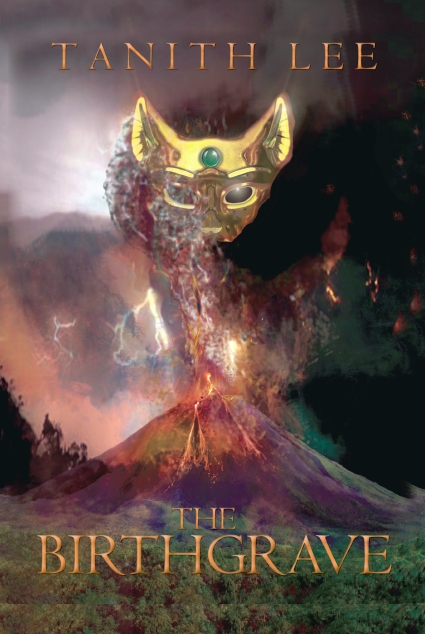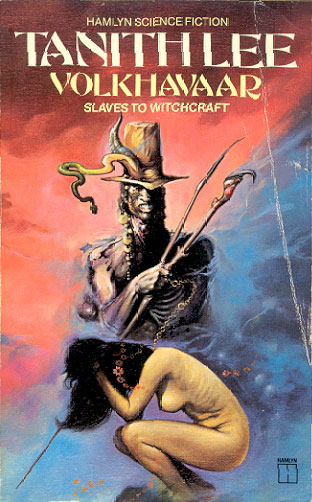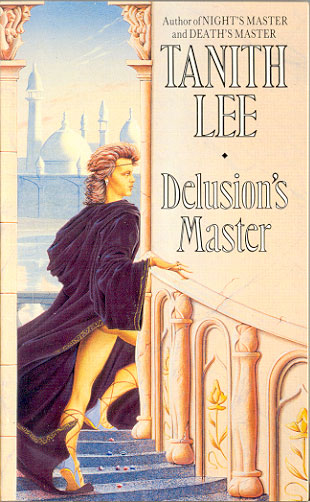Another great way to relax is of course to lose yourself in the pages of a good book. I don't get to do this as often as I used to these days, but I've found recently that reading for my sister has reawakened my love for the printed word. So let's draw the curtains against the night's chill, build up the fire in the hearth and curl up in our favourite easy chair as the shadows jump and dart and cavort on the walls like crazy dark dancers, and select another volume from

The last time I did this --- and I don't do it enough, but there is a lot of work involved --- we looked at a very famous author, one whose name has gone down in history and become synonymous with the horror story and dark gothic fiction. The writer I want to feature this time is nowhere as famous as Poe, but well respected in her field and certainly a favourite of mine.
 Tanith Lee (1947 - )
Tanith Lee (1947 - )
Born in London just after World War II ended, the fact that both of Tanith Lee's parents were ballroom dancers comes through in many of her books, where dance and the fluid and graceful movements of characters both suffuse her characters and drift among the titles of her novels, such as “Dark dance”. Another writer snubbed by her homeland, her first novel, “The Birthgrave”, was rejected by many English publishers and looked unlikely to ever see the light of day till she turned to an American concern, DAW Publishing, who released it and who then went on to publish almost thirty of her books over a fourteen-year period.
Lee writes mostly what could be described as “adult fantasy”, though she has also written many children's stories, and dipped her toe into historical novel writing. Her fantasy novels range from light-hearted, Fritz Leiber-style magical tales with demons, princesses and dragons to darker, more gothic works. She strikes the kind of balance well that few other writers in her genre manage, having some of her stories set in totally fantasy, imagined worlds while others are deeply rooted in the mundane and the normal, to which she brings a strong sense of the old world intruding on the new, magic lurking and working in the background, the old ways still extant.
Although she is a favourite author of mine, I have not read a tenth of what she has written, and my experience of the wide variety of her work is quite minimal really. But almost everything of hers I have read I have enjoyed, and in the list below I'll annotate anything that impressed or disappointed me about the books. At the moment I've just finished reading “Dark dance” for my sister. I remember thinking when I bought it originally that it was very dark, depressing and bleak, and I don't believe I finished it at the time, passing it on to my sister. Now, re-reading it for the first time, and for someone else --- a situation which precludes throwing in the towel halfway --- I think I appreciate it much more, and indeed the ending was quite satisfactory if a little perhaps predictable. We're now waiting for the second and third books to arrive so we can continue the story.
Selected list of works:
The Dragon Hoard (1971)

Her first ever novel, published for children and with a suitably childish story featuring a spurned sorceress, a cursed king and of course a quest, it nevertheless must have given Lee great confidence to have had one of her works published, and would lead to greater things as the years wound on and her writing style developed.
Animal Castle (1972)
The unlikely story of a kingdom without animals, and how, with the arrival of a shaggy dog one day to his kingdom, the king suddenly decided he must have animals. And of course the story of what then happened. Another children's book, her second publication, this time a picture book.
The Birthgrave (1975)
First in the Birthgrave Trilogy

Her first proper fantasy novel for adults, this was the book that so many British publishers passed on, and that she eventually had to look to America to achieve its publication. It's part of a trilogy, as above, and though certainly not one of her best novels in my opinion, would go to solidify her place as one of the most exciting new emerging feminist writers in the genre.
It's a long time since I read any of her books, so rather than try to describe them from memory --- apart from one or two which really impressed me ---I'll leave it to reviewers who can talk about them better than I can. Here's what one has to say about this, her first real novel.
“The main character is a woman of the old race- humanlike creatures with apparent immortality and powers above and beyond that which we possess. She awakens in a volcano, and is told by the spirit in the fire that she is the last of her kind and will spreada curse of unhappiness*across the land, unless she can unlock the secrets to the power and knowledge hidden within herself. Thus she leaves the mountain on a series of adventures, trying to discover the lost truth of her own past.”
Marion Zimmer Bradley, already a big name in the fantasy genre and one of the doyennes of British fantasy fiction, wrote an introduction to the book --- so impressed was she by the newcomer --- that says it all really: "It's filled with adventure and beauty, rich alien names, half-sketched barbarian societies, ruined cities, decadence and wonder. “ Indeed.
Don't bite the sun (1976)
First of the Four-BEE sequence
Lee's first step away from fantasy and into the world of science-fiction, “Don't bite the sun” tells the tale of indolent humans who live on a doomed world, where they are required to do nothing but have endless sex, use drugs and even kill themselves, whereupon they are reborn into a body of their choosing. Suicide, in fact, becomes less a last desperate act and more a way of ending a boring existence and starting a new life. The main character tires of life in the city though and ends up joining an expedition to explore the blasted, desolate wilderness outside the city domes, realising that perhaps she belongs here rather than in the sterile cities.
The Storm Lord (1976)
First in the Wars of Vis trilogy

Only a year after her first major novel was published, Lee was already hard at work on a second trilogy, this one concerning, according to the book's jacket:
“an unknown planet and of the conflict of empires and peoples on that world. It is the story of a priestess raped and slain, of a baby born of a king and hidden among strangers, and of how that child, grown to manhood, sought his true heritage. It is a novel of alien gods and lost goddesses, of warriors and wanderers, and of vengeance long delayed. It is an epic in every sense of the word.”
To go further, in the words of one reviewer:
“The Storm Lord follows the path of a young man, Raldnor, son of Ashne'e, a priestess of Anackire the Snake Goddess, and Rehdon, King of Vis. The Lowland people are nearly albinos, pale skinned, blond to white haired, golden eyed; the Vis are dark. Raldnor is born too early, as Rehdon's Queen, Val Mala, sends poisons to Ashne'e to make her abort the child and keep her standing, as well as her son's. She insists her woman, Lomandra, provide her with the dead child's finger. Ashne'e, in turn, cuts of Raldnor's pinky finger to send back to Val Mala, and the poisons take her. Lomandra, in turn, carries Raldnor out of the city, only to die in the Lowlands herself, trying to keep him safe. He is adopted into a Lowlands family, but when his adopted mother dies, he leaves to seek his way in the world.
As this is a Tanith Lee novel, nothing is ever easy, and Raldnor must go through a great many trials and tribulations to reach his goal - which turns out to be raising up the Lowlanders to shake off the yokes Vis put on them. His half brother, Amreck, the Storm Lord, threatens at every turn, as well as pirates and other dangers, including war. And above everything, Anackire watches, the great Snake Goddess of the Lowlanders, and Her presence is felt throughout the story.”
Drinking sapphire wine (1977)
Second in the Four-BEE sequence
The continuation, and conclusion of the story begun in “Don't bite the sun”, as the main character is exiled from the city and must learn to survive in the harsh, inhospitable wilderness that makes up most of the doomed planet.
Volkhavaar (1977)

As far as I can see, apart from her early children's stories, the first novel Tanith Lee wrote that was not part of a trilogy or sequence, and to my mind suffers for it. The first of her novels I read that I remember being desperately disappointed in, having already read later books and loved them. Though it is over thirty years since I read it, and perhaps I might appreciate it more through the lens of age and experience, as they say, life's too short to listen to bad music or read bad novels.
Here's what the jacket has to say about it.
“A novel of witchcraft and wonders on a world far removed from those we know. Here the gods contend for power - the Dark forces against the Light - and here an entire city and its land is plunged into the shadow of an evil beyond anything conceivable. It is the story of Shaina the slave girl and of Volk the outcast who enslaved himself to cosmic forces to gain total power - and of how they were finally to meet and clash - with an entire world as their prize. “Volkhavaar” is high fantasy comparable only to the best of Andre Norton and Michael Moorcock.”
High praise indeed, given that Moorcock was and is one of my alltime favourite fantasy writers (I'll certainly feature him at some point later), but the recommendation loses some of its impact when you realise it is not attributable to anyone, except the publisher, who would of course have wanted to put the most positive spin on the book that they could.
Night's Master (1978)
First in the Tales from the Flat Earth sequence

Now we're cookin'! The first ever Tanith Lee novel I read and it just floored me with its tales of capricious but somehow lovable demons, enchanted gardens, doomed youths and weird creatures, and above all striding taller and more dangerous than any demon, the indomitable greed and folly of mankind. Or as the jacket would have it:
“In those days the Earth was not a sphere and the demons dwelled in vast magical caverns beneath its surface. Wondrous cities dotted the land and strange peoples and fabulous beasts prowled the deserts and jungles of the world.
Supreme among those mighty demons was Azhrarn, Night's Master. He it was whose pranks made nightmares on Earth, who brought desire and danger to those it amused him to visit, and who could grant wonders and create horrors unspeakable.”
I can't praise this novel enough. It fed right into the kind of fantasy I had become entranced with via the likes of Michael Moorcock, Craig Shaw Gardner, Jack L. Chalker and Alan Dean Foster. Much less portentous and poe-faced than Tolkien, but taking itself more seriously than Pratchett, this was the apex, for me, of Tanith Lee's writing, when she got it spot on. The demon Azrhrarn likes to use humanity as his amusement, his plaything, but comes to realise that he needs them as much as they need him. Just superb, and led into a series of books that varied in quality but generally held up to, but never eclipsed, this opening volume.
Shadowfire (1978)
Second in the Birthgrave trilogy
For some reason retitled “Vazkor, son of Vazkor” for the American market (surely a more confusing title than “Shadowfire”?) this
“tells the story of Tuvek, a warrior in a barbarian tribe, his alienation from his people, and is discovery of his family history and the Power that he has inherited. Alienated from his tribe and following a raid by survivors from the fallen cities, Tuvek is captured and taken to the city of Eshkorek, where he comes into his own Power Tanith Lee did a great job of sketching out the history of the tribes and the ruins of the fallen civilisation close by them. She also deftly described the world through Tuvek's eyes, exploring his own growth and the cultures and people he discovers.” Artwork on this looks very Boris Vallejo or Frank Frazetta, I must say!
Quest for the White Witch (1978)
Third in the Birthgrave trilogy
The final book of three, this concentrates on Vazkor, eponymous (in the American version anyway) hero of the previous one, as
“he retraces her (his mother) steps, like her tells the story in his own voice, and if the fascination of the first book lies in the mystery of her identity, the fascination of this middle lies a great deal in his so very different perspective. Vazkor is very hard to like in that book--a raping sword-swinging barbarian. But there is more to him here, as in his quest--for revenge against his mother--he increasingly comes into his powers and sees the value in others. Lee's style and her world could both be described as lush. Though along with Tanith Lee's poetic prose you're going to get a psychological complexity you're not going to find in Conan the Barbarian.”
Electric Forest (1978)
Another excursion into pure science-fiction, as Lee tells the story of an outcast who becomes the only one who can save her planet.
“The world called Indigo turned upside down for Magdala Cled one unexpected morning. From being that world's only genetic misfit, the shunned outcast of an otherwise ideal society, she became the focus of attention for mighty forces. Once they had installed her in the midst of the Electric Forest, with its weird trees and its super-luxurious private home, Magdala awoke to the potentials which were opening up all about her. And to realize also the peril that now seemed poised above Indigo ... which only she, the hated one, could possibly circumvent.”
Death's Master (1979)
Second in the Tales from the Flat Earth sequence

Again I remember this carrying on the grand fantasy tradition of “Night's Master”, and it was a series I really could not get enough of. Concentrating this time on Uhlume rather than Azhrarn, as the jacket explains:
“In those days the world was flat and demons dwelled beneath who walked among the cities and kingdoms of the surface with powers and mischiefs to please themselves.
Among those demons there were two who were mighty above all others. One was Azhrarn, Night's Master, and the other was the lord of darkness whose name was Uhlume, Death's Master.
This is Tanith Lee's epic fantasy novel of the strangest exploit of these two demon-lords among the men and women of Earth. It is a novel of odd erotic desires, of twisted ambitions, and superhuman feats. It is the story of two boys who became men under the stresses of witcheries and wonders that surpass even the fabled lore of the Arabian Nights ... and the story also of queens and witches, of kings and commoners - and of the two terrible lords of darkness.”
The book was nominated for the 1980 Balrog Award and actually won the August Derleth Award that year, two very highly coveted recognitions of a writer's talent in, and contribution to the genre.
Delusion's Master (1980)
Third in the Tales from the Flat Earth sequence

Once again Lee takes us to the realm of one of the dread lords of the Underearth, this time it is Chuz, lord of madness.
“When the world was flat and the gods had not yet restructured the universe, the cities and hopes of mankind hung upon the whims of the immortal lords of all diabolical powers.
For these, such as Azhrarn, Night's Master, and Uhlume, Death's Master, the world was a flesh-and-blood playground for all their strangest desires. But among those demonic lords, the strangest was the master of madness, Chuz.
The game that Chuz played with a beautiful woman, with an ambitious king, with an ancient imperial city, was a webwork of good and evil, of hope and horror. But there was always Azhrarn to interfere - to bend delusion to a different outcome - and it was a century-long conflict between two vain immortals with women and men as their terrified pawns.”
Delirium's Mistress (1981)
Fourth in the Tales from the Flat Earth sequence

The point at where I recall the quality beginning to slide just a little. I remember being slightly disappointed with “Delerium's mistress”, feeling that it somehow didn't hold up to the high standard of the last three novels. But then, that bar had been set very high by the author, so I suppose you can't expect perfection every time. But given that it was the last full novel in the series, you can't help but wonder was she growing bored of it, or running out of ideas? I seem to remember some of the ideas from the previous books being rehashed, changed slightly, though again as I say it was thirty-some years ago. But the memory of disappointment definitely remains to this day.
“In the age of demons, when the Earth was still flat, a daughter was born to a mortal beauty and Azhrarn, Demon Lord of Night. This Daughter of the Night was called Azhriaz, and she was hidden away on a mist-shrouded isle, spirit-guarded, to spend her life in dreams. But Azhriaz was destined for more than dark dreaming. For if her father was the Lord of Night, her mother was descended from the Sun itself.
And her beauty and power soon called to another mighty demon lord, Azhrarn's enemy, Prince Chuz, Delusion's Master, who worked a magnificent illusion to free Azhriaz from her prison and transform her into Delirium's Mistress.
As Mistress of Madness and Delirium would she become known in realms of both demon and humankind. And her destiny would make her goddess, queen, fugitive, champion, seeress - and her to whom even the very Lord of Darkness would one day bow down....”

























 Linear Mode
Linear Mode
